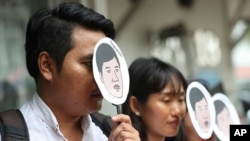The blows from the men in visored helmets swinging metal pipes came fast and furious, Anurak Jeantawanich recalled.
The pro-democracy activist had just left his home south of Bangkok on the morning of May 25 to lead a protest against alleged cheating in the general election two months earlier when two men rammed his motorbike from behind on a busy street and knocked him to the ground.
Anurak said another motorbike hit him a second time after he scrambled to his feet, then a third time when he stood up yet again.
"After that, I think four of them came and they tried to hit me, hit me, hit me again and again," he said. "They tried to hit me in the head ... many, many times."
A CCTV camera caught the brazen attack at a distance; the footage shows the gang hopping back on their motorbikes and speeding away as suddenly has they had come, leaving Anurak bruised and bloodied.
It was one of seven violent attacks — the second on Anurak himself — against vocal critics of the military junta that seized power in 2014 since the March 24 election that ultimately returned coup lead Prayuth Chan-ocha to the prime minister's post, according to Thai Lawyers for Human Rights. That's as many attacks as the rights group documented in the 12 months leading up to the poll.
Activists and rights groups say the similarities and timing of the assaults — either before or after a pro-democracy event — suggest government involvement. They fear they may presage a pro-junta administration bent on maintaining the military's grip on power by any means necessary.
"The fact that there have been more than 10 attacks [this year] against three activists repeatedly, and Thai authorities have failed totally to conduct a serious investigation and bring those responsible to justice — these suggest possible government involvement," said Sunai Phasuk, a senior researcher for Human Rights Watch in Thailand.
He said the attacks also have grown more bold and violent, "as if they want to show that ... this is going to be the consequences of anyone who dare to challenge military power."
The latest gang assault, on Friday in Bangkok, sent anti-junta activist Sirawith Seritiwat to the intensive care unit with a broken nose and orbital fracture, sparking a groundswell of rebuke against authorities and mounting demands for justice.
Police Watch, a local rights group, has demanded that national police chief Chakthip Chaijinda be fired if authorities fail to make speedy progress in solving the case. The Future Forward party, the rising star of Thailand's progressive political opposition, said it was setting up a working group in response to the attack to monitor the harassment of activists.
Sunai said the brutality of the assault on Sirawith and the photos of the blood-spattered activist that soon shot across social media marked a turning point.
"It kind of put the Thai society to a point that ... enough is enough, they cannot put up with this violence, with such violence any more," he said. "Even those who disagree with these pro-democracy activists have come out and become very vocal in demanding justice."
The junta has vowed to deliver.
Acknowledging the rising tide of anger, Prayuth came out to say he had ordered the police to speed up their investigation into Sirawith's assault. Deputy Prime Minister Prawit Wongsuwon, Thailand's security czar, has followed suit, according to his spokesman.
Speaking with VOA, an adviser to Prawit, Panitan Wattanayagorn, would not deny that security forces might have been involved in the attacks while the investigations were still open. But he said the government had no incentive to assault the activists, knowing the public blowback that would draw.
"The government has no motive in attacking citizens because in the end the government will be held responsible and the burden of proof that citizens are given enough protection and safety is upon the government, so I think no government will be in a position to have motive to attack their own citizens," he said.
Police spokesman Kritsana Pattanacharoeun told VOA investigators were still trying to identify the men who attacked Sirawith. Like Panitan, he would not rule out any possible motive or culprits, not even the police themselves.
"I really can't pinpoint as to who is behind the attack at the moment, and I really can't deny or admit," he said.
Kritsana insisted those responsible would face justice, regardless of who they are. "We don't do double standard here," he said.
Anurak said he had no doubt about who was behind the attacks against him and his fellow activists.
He accused the junta of ratcheting up the violence to further intimidate its critics before the Section 44 powers of the interim constitution it ushered in on the heels of the 2014 coup, which effectively allow Prayuth to rule by decree, come to an end once the new government takes office.
"They [are] afraid that people will rise up and do the protest like Hong Kong last week, so they try to scare people. And the best way to scare people now at the moment is to attack all the activists, attack all the activists again and again, and harder and harder," he said.
But Anurak said their cause would remain.
"I want my country to have democracy," he said. "We want fair elections. We don't really care which side [is] going to win, but we just want fair elections. We believe that only democracy will bring back good for the country."




